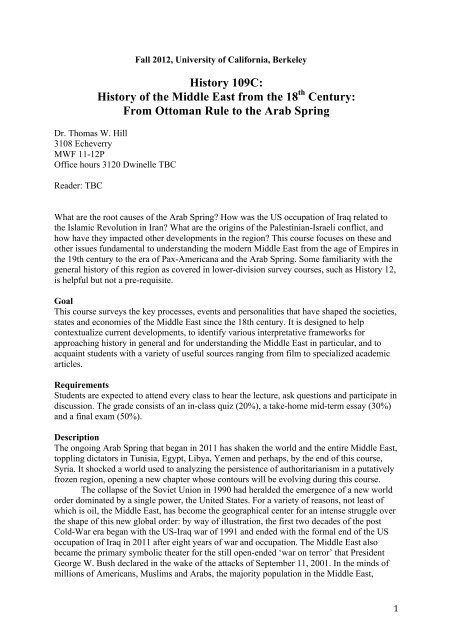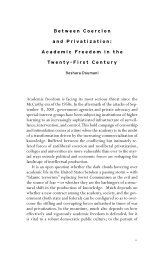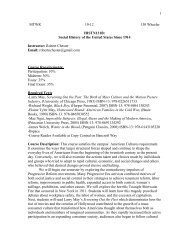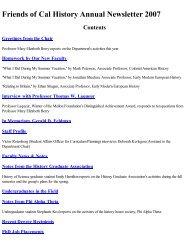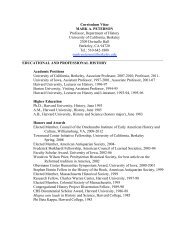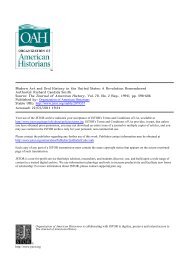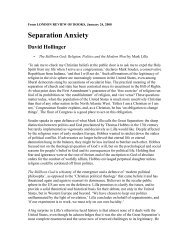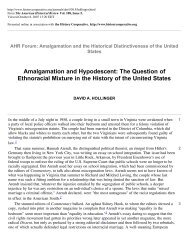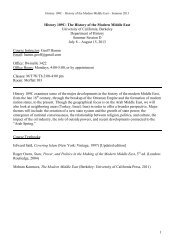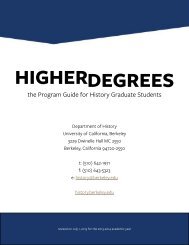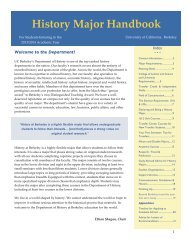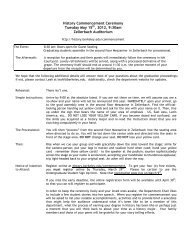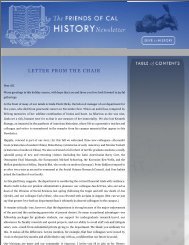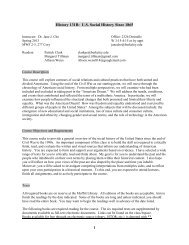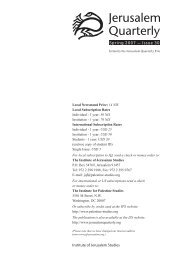109C Syllabus T W Hill Final.pdf - Department of History, UC Berkeley
109C Syllabus T W Hill Final.pdf - Department of History, UC Berkeley
109C Syllabus T W Hill Final.pdf - Department of History, UC Berkeley
You also want an ePaper? Increase the reach of your titles
YUMPU automatically turns print PDFs into web optimized ePapers that Google loves.
Part II: From Empires to StatesWeek 2: The Ottoman Legacy: The View from the CentreSeptember 5, 7 (no class September 3: Labor Day)• Donald Quataert, The Ottoman Empire, 1700-1922, 2 nd ed. (Cambridge UP, 2005), 1-12, 54-110• James Gelvin, “The Question <strong>of</strong> Modernity,” in The Modern Middle East, Chs. 5-7,69-132 (inc. photo essay 111-32)Week 3: Land & Labour: The View From BelowSeptember 10, 12, 14• Judith Tucker, “Decline <strong>of</strong> the Family Economy in Mid-19 th -Century Egypt,” ArabStudies Quarterly 1:3 (1979), 245-271• Akram Khater, “Assaf: A Peasant <strong>of</strong> Mount Lebanon,” in Edmund Burke III & DavidN. Yaghoubian, eds., Struggle & Survival in the Modern Middle East, 2 nd ed. (<strong>UC</strong>Press, 2005), 35-47• Sherry Vatter, “Journeymen Textile Weavers in 19 th -Century Damascus: A CollectiveBiography” in ibid., 64-79• Beshara Doumani, “The Political Economy <strong>of</strong> Olive Oil” in Beshara Doumani,Rediscovering Palestine: Merchants & Peasants in Jabal Nablus 1700-1900(Cambridge UP, 1995), 131-81• Timothy Mitchell, “Can the Mosquito Speak?” in Timothy Mitchell, Rule <strong>of</strong> Experts:Egypt, Techno-Politics, Modernity (<strong>UC</strong> Press, 2007), 19-53• Salim Tamari, “Wasif Jawhariyyeh, Popular Music & Early Modernity in Jerusalem”in R. Stein & T. Swedenburg, eds., Palestine, Israel & the Politics <strong>of</strong> Popular Culture(Duke UP, 2006), 27-50• * Erika Friedl, “Tribal Enterprises & Marriage Issues in 20 th -Century Iran” in BesharaDoumani, ed., Family <strong>History</strong> in the Middle East: Household, Property & Gender(SUNY Press, 2003), 151-70Week 4: The Encounter with Europe & the Formation <strong>of</strong> the Modern State SystemSeptember 17, 19, 21• Gelvin, “The Question <strong>of</strong> Modernity”, Chs. 8-10, 143-179• Quataert, 111-202• C. Smith, Palestine & the Arab-Israeli Conflict, Chs 1-3, 13-164• Roger Owen, “Egypt & Europe: From French Expedition to British Occupation” inRoger Owen & Bob Sutcliffe, eds., Studies in the Theory <strong>of</strong> Imperialism (London:Longman, 1972), 195-209• Alexander Scholch, “European Interest in Palestine” in Scholch, Palestine inTransformation 1856-1881 (Washington, DC: Institute for Palestine Studies, 1993),47-75• * Gershon Shafir, Land, Labor & the Origins <strong>of</strong> the Israeli-Palestinian Conflict 1882-1914 (<strong>UC</strong> Press, 1996), 1-44Week 5: Nation-Building in Turkey & Iran4
September 24, 26, 28• Gelvin, “WW1 & the Middle East State System”, 171-196• Ali Ansari, Modern Iran, 1-158§Part 3: Colonialism, Nationalism & the Social QuestionWeek 6: “To Reign but not to Govern.” The Colonial Experience in Egypt & IraqOctober 1, 3, 5• Gelvin, “The Introduction & Spread <strong>of</strong> Nationalism,” Chs. 11-12, 184-207• Gelvin, “The Contemporary Era”, 233-9• Khaled Fahmy, “Mehmed Ali’s Army & the Egyptian Nation” in All the Pasha’s Men(Cambridge UP, 1997), 239-277• Hanna Batatu, The Old Social Classes & Revolutionary Movements in Iraq (Saqi,2004), Chs. 2, 17• Hanna Batatu, The Egyptian, Syrian & Iraqi Revolutions (Georgetown, 1984)• Joel Beinin & Zachary Lockman, “1919: Labor Upsurge & National Revolution” inWorkers on the Nile (A<strong>UC</strong> Press, 1998), 83-120• Ellen Fleischmann, “The Other “Awakening”: The emergence <strong>of</strong> women’s movementsin the modern Middle East, 1900-40” in Meriwhether & Tucker, 89-134• Tripp, <strong>History</strong> <strong>of</strong> Iraq, Chs. 2-3, 30-104• * Juan Ricardo Cole, “Feminism, Class & Islam in Turn-<strong>of</strong>-the-Century Egypt”,International Journal <strong>of</strong> Middle East Studies 13 (1981), 387-407Week 7 (& beginning <strong>of</strong> 8): Mandate Syria, Lebanon, Palestine; Republican IraqOctober 8, 10, 12• Elizabeth Thompson, Colonial Citizens. Republican Rights, Paternal Privilege &Gender in French Syria & Lebanon (Columbia UP, 2000), 19-57• Tripp, A <strong>History</strong> <strong>of</strong> Iraq, Ch. 5, 143-84• Gelvin, “The Origins <strong>of</strong> the Arab-Israeli Dispute”, Ch.14, 217-31• Zeev Sternhell, The Founding Myths <strong>of</strong> Israel (Princeton UP, 1999), 3-46• Avi Shlaim, “The Debate About 1948”, International Journal <strong>of</strong> Middle East Studies27:3 (August 1995), 287-304• Ted Swedenburg, “The Role <strong>of</strong> the Palestinian Peasantry in the Great Revolt (1936-39)” in Burke & Lapidus, eds., 169-204• * Benny Morris, ‘Survival <strong>of</strong> the Fittest’, interview with Ari Shavit, Haaretz, 8January 2004, http://www.logosjournal.com/morris.htm [15pp.]§Part IV: Economic Development & Regional Conflicts in the Cold War EraWeek 8: Arab Nationalism & the Politics <strong>of</strong> the Cold War5
October 15, 17, 19• Yezid Sayigh & Avi Shlaim, eds., The Cold War & the Middle East (Oxford UP,1997): Introduction, Ch 1, Conclusion: 1-26, 279-92• Malcolm Kerr, The Arab Cold War: Gamal Abd al-Nasir & his Rivals, 1958-70, 3 rded. (Oxford UP, 1971), 1-43Week 9: Oil & the State: From Import Substitution to Structural ReadjustmentOctober 22, 24, 26• Gelvin, “State & Society”, “Oil”, Chs. 15-16, 240-65• Alan Richard & John Waterbury, A Political Economy <strong>of</strong> the Middle East, 3 rd ed.(Westview Press, 2007), Chs. 7-9 [173-250 in 2 nd ed, 1996]• Excerpts from speeches by Jamal Abd al-Nasser & Anwar Sadat in Marvin Gettleman& Stuart Schaar, eds., The Middle East & Islamic World Reader, 3 rd ed. (Grove Press,2012), Ch.7, 31 (a) & (b): 289-293• Albert O. Hirschman, “The Political Economy <strong>of</strong> Import-SubstitutingIndustrialization”, Quarterly Journal <strong>of</strong> Economics 82 (1968), 1-29Week 10: The Palestinian National Movement & the Arab-Israeli Conflict to the OsloAccordsOctober 28, 31, November 2• C. Smith, Palestine & the Arab-Israeli Conflict, Chs. 7-9, 300-432• J. Migdal, “Changing Boundaries & Social Crisis: Israel & the 1967 War” inHydemann, 174-99Week 11: The Lebanese Civil WarNovember 5, 7, 9• MERIP Primer, “Lebanon’s 15-year War: 1975-90,” Middle East Report 162 (Jan-Feb1990), 23-25• Salim Nasr, “Lebanon’s War: Is the End in Sight?,” Middle East Report 162, 5-8• Ussama Makdisi, “The Modernity <strong>of</strong> Sectarianism in Lebanon,” Middle East Report26:3 (Summer 1996), 23-26• Sune Haugbolle, War & Memory in Lebanon (Cambridge UP, 2010), 161-193• Elizabeth Picard, “The Political Economy <strong>of</strong> Civil War in Lebanon” in StevenHydemann, ed., War, Institutions & Social Change in the Middle East (<strong>UC</strong> Press,2000), 292-322§Part V: The Middle East & the US/The US in the Middle EastWeek 12: The Islamic Revolution in Iran & the USNovember 14, 16 (No class November 12: Veterans’ Day)6
• Gelvin, Chs. 17-20, 266-318• Ansari, Modern Iran, 159-345• “US Presidential Policies 1947-2002” in Gettleman & Schaar, Ch.7, §27 (a)-(e)• Ervand Abrahamian, “Ali Shariati: Ideologue <strong>of</strong> the Iranian Revolution” in EdmundBurke III & Ira Lapidus, eds., Islam, Politics & Social Movements (IB Tauris, 1988),289-97Week 13: Israel Over Palestine: the Political Economy <strong>of</strong> OccupationNovember 19, 21 (No class November 23: Thanksgiving)• Charles Smith, Chs. 10-11, 333-536• Beshara Doumani, “Family & Politics in Salfit” in Lockman & Beinin, 143-54http://history.berkeley.edu/sites/default/files/family_and_politics.<strong>pdf</strong>• Peter Lagerquist, “Privatizing the Occupation. The Political Economy <strong>of</strong> an Oslodevelopment project”, Journal <strong>of</strong> Palestine Studies 32:2 (Winter 2003), 5-20• Jeff Halper, “The 94% Solution: A matrix <strong>of</strong> control,” Middle East Report 30:3 (Fall2000), 15-19• Benny Morris, Ehud Barak, Robert Malley & Hussein Agha, “Camp David & After:An exchange”, The New York Review <strong>of</strong> Books, June 13 & 27, 2002Week 14: The US & the Middle East from 9/11 to the ‘Arab Spring’November 26, 28, 30• Tripp, A <strong>History</strong> <strong>of</strong> Iraq, Ch.7• Gelvin, “The Middle East in the Age <strong>of</strong> Globalization”, 319-337• Asef Bayat, “Activism & Social Development in the Middle East”, InternationalJournal <strong>of</strong> Middle East Studies 34:1 (Feb 2002), 1-28• Joel Beinin & Joe Stork, “On the Modernity, Historical Specificity & InternationalContext <strong>of</strong> Political Islam” in Beinin & Stork, eds., Political Islam. Essays fromMiddle East Report, 3-25• “President Obama’s Vision for New Beginnings in the Middle East: Cairo University,Egypt, June 4 2009” (Ch. 8, §36) in Gettleman & Schaar• Ahmed Kanna, “Dubai in a Jagged World”, Middle East Report 243 (Summer 2007),23-9• Perry Anderson, “On the Concatenation in the Arab World”, New Left Review 68(March-April 2011), 5-157


